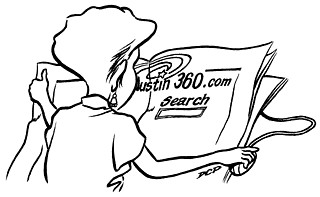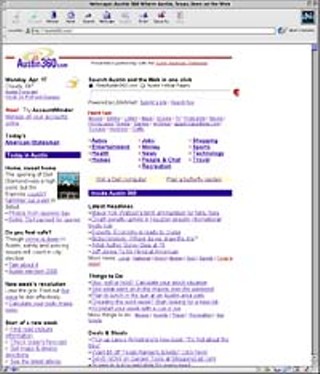Media Clips
The New News Thing: Newspapers Struggle to Find Niche on the Net
By Lee Nichols, Fri., April 21, 2000

'Round and 'round it goes, and where it stops, nobody knows -- the Internet is indeed something of a roulette wheel. The Net is radically transforming much of our world, and few industries have been impacted as heavily as journalism. Thus far, the sector of journalism scrambling hardest to find a niche on the Net is the daily paper. That could change soon, of course -- as online video and audio technologies improve, which they are doing rapidly, television and radio will have to move aggressively to capitalize on new opportunities presented by the Internet. So far, however, the World Wide Web is mostly about words on a screen.
There are many things the Web could be -- millions of entrepreneurs are out there, right now, in myriad industries, searching for the next hot innovation.
But there is one important thing that the Web will not be. Contrary to oft-repeated predictions, it won't be a great democratizing force leveling the media field. For the most part, the major, most-visited sites conveying information will be dominated by the well-financed corporations, the same giants who currently reign over television, newspapers, radio, and other media.
What the Web could do is completely change the nature of how we define newspapers. Will daily papers simply put their morning's content on their sites, or will they try to keep pace with -- or even outpace -- the immediacy of broadcasters by updating their reports throughout the day? If it's the latter, will we cease to think of these institutions as just papers and start viewing them as some sort of new reporting entity altogether? And with all of the cross-medium joint operating agreements and technological convergence on the Web, will there come a day when we no longer distinguish between paper, TV, and radio, and simply think of all journalists as part of a newsgathering whole?
Those are questions for the (probably near) future. But as for newspapers today, more relevant questions are: What are the dailies -- especially the Texas dailies -- doing right now to establish a presence online? And who is the best?
Here in Austin, of course, the Austin American-Statesman's Web presence takes the form of Austin360.com. Actually, Austin360 touts itself as being "presented in partnership with" the Statesman, and this venture is indeed intended to be more than just a newspaper -- it aims to be sort of a community gathering place, with tips and guides to everything from autos to jobs to travel. Much like the daily paper itself, it tries very hard to be all things to all people.

And, as such attempts invariably are, it manages to be pretty mediocre. Following a pattern consistent to all of the city sites operated by Cox Interactive, a branch of the Statesman's parent Cox Enterprises, 360.com is an unfocused mishmash of this, that, and the other, good for a little curious dabbling that lacks any focus to zero in on. It does manage to be a decent reference guide to a variety of Austin activities, but that seems to be its best quality -- delivery of news definitely comes second.
This is reflected in the first thing you see as the page comes up -- the "Things to Do" section gets higher billing than "Latest Headlines." Headlines are followed by an advertising and shopping section which gets just as prominent billing, and a big chunk of the site is devoted to message boards, as if those weren't already ubiquitous enough on the rest of the Net. Sprinkled throughout the site is that annoying child of the telephone call-in poll, the Web poll -- one of the most useless of journalism's experiments in "reaching out" to its readers/viewers.
The Statesman is hardly alone in creating this sort of "community center" venture. The Houston Chronicle is involved in a very similar venture called myhouston.com -- remarkably similar, in fact, right down to the site's design. News is positioned a little more prominently here than on 360.com, although the real emphasis seems to be on shopping. Both The Dallas Morning News and the Fort Worth Star-Telegram, meanwhile, are tied into dfw.com. An important distinction between these sites and 360.com, however, is that the former are not promoted as the main Web sites for those respective papers.
None of those sites, however, can compare for sheer lack of direction (and a lack of emphasis on news) to mysanantonio.com, a product of the San Antonio Express-News and local station KENS-TV. While the other sites at least have clear links to the actual sites of their newspapers (the Houston Chronicle is at http://www.chron.com; the Morning News is at http://www.dallasnews.com and the Star-Telegram is at http://www.star-telegram.com), mysanantonio.com has no link to an independent Express-News site, and apparently offers up only some of the daily paper's news content rather than all of it. They also seem pretty slow to update -- on a recent Sunday, the most current stories on the site were Saturday's news. Those stupid Web polls are mixed in directly alongside the news headlines. On the upside, shopping is less heavily emphasized, relegated to a spot near the bottom of the intro page.
Looking away from the fluff that newspapers put on these sites and toward their attempts to provide hard news, to what ends could newspapers most effectively use the Internet to enhance their coverage?
The Web seems to offer three big advantages over the paper version:

Where organizing and grouping are concerned, the Morning News does the best job of making issues easy to find. Right on its front page, a section called "In the News" has direct links to coverage of the 2000 presidential race, a special Bush section, the Waco investigation, America's health-insurance crisis, and the recent Fort Worth tornados. Overall, the page is completely organized for delivery of news, and is not intended to be a shopping guide.
360.com has those groupings as well, but not as prominently featured -- you have to hunt around a bit. In fact, though it doesn't put them front-and-center, 360.com seems to actually do a better job at providing such categories. After going to a story about, say, Mayor Kirk Watson's campaign, it's possible to find some very helpful information on local issues. Why not make this the main focus of the whole venture?
360.com does have a special Bush section, for which they almost seem apologetic, offering an explanation of why they would do such a thing. No explanation should be necessary -- if the state capital's hometown newspaper didn't offer a thorough look at our governor's run for the presidency, it would be sorely remiss in its duties (as are, say, the Houston, Fort Worth, and San Antonio sites, which apparently offer no such features).
On breaking news, no one seems to have a clear edge on local stories; as for national stories, the Morning News, with its more thorough national/international presence, can deliver original updates from its own staff (one would expect the Statesman to do the same with its connections to Cox's national/international staff, especially since they are usually identified in bylines as "American-Statesman staff"). All the sites include reports, updated throughout the day, from the Associated Press; the Morning News features a direct connection to AP's own Web site. None of the sites really compare to the likes of yahoo.com, which even beats out CNN's site for breaking coverage.
If you're doing some sort of research (like, say, for a media column at an alternative weekly), the Web offers no greater innovation than the online archive. For a while, the granddaddy of American newspapers, The New York Times (nytimes.com), as well as some other papers, offered free access to their archives, but those days are dead. Everyone charges now.

Not surprisingly, the Morning News has the deepest archive, going all the way back to 1984; as for service, however, the DMN wasn't up to snuff when this article was being researched. In what one would assume is a temporary problem, searches for recent articles on Gov. George W. Bush would only pull up stories from 1998. Nationally, perhaps the most impressive site belongs to The Washington Post, whose archives go back as far as 1977; The New York Times offers only a 365-day archive.
Among the other Texas papers, the Star-Telegram doesn't even have an archive (at least none that we could find). Of those papers that do, the Express-News ranked worst in content: It contained all Express-News articles only back to 1992, when the Hearst Corp. bought the paper and shut down its own San Antonio Light. The archive also contains Light articles from 1989-92, but is missing many of the Express-News articles from that period.
The Houston Chronicle ranks the worst in service, allowing access only to the paper's subscribers.
So who's taking best advantage of the Web in Texas? Right now, nobody really seems to have a handle on the medium's potential. Early fears about the Web killing off papers appear to have been groundless -- it's just too hard to relax and enjoy reading a computer screen over breakfast -- but newspapers do need to realize that they can get a leg up by harnessing the Internet to enhance what they do. Until the dailies figure this out, online readers will just be better off checking the likes of yahoo.com, a non-newspaper site that beats traditional journalism outlets at their own game.
Editorship Undervalued
Statesman editor Rich Oppel was elected president of the American Society of Newspaper Editors on Friday. The ASNE membership is composed of hundreds of editors from around the country, representing some of the nation's biggest newspapers.
In covering this event, the Statesman reported: "No matter how the news is delivered, Oppel said, editors must ensure that the values of accuracy, fairness, balance, verification, independence, compassion, and connection to the community are maintained."
As readers of Michael Corcoran's Statesman column well know, Oppel and his paper profess deep reverence for such values -- Corcoran's "Austin Inside/Out" was put on hiatus for problems, according to Statesman management, with "accuracy, fairness, and tone." (See "Naked City," March 31.)
"Media Clips" would like to suggest that Oppel start with himself in enforcing these values. Last year, Oppel went on a long series of tirades against Austin environmentalists in which he misportrayed the city's advisory commissions, especially the Water & Wastewater Commission, as having the ability to stop development (and progress) dead in its tracks, and blamed them for almost every problem in Austin short of pestilence and plague. He compared W&WW to the KGB, and called them extortionists and "the little green commission with the Napoleonic vision" ("Media Clips," Aug. 20).
His paper went even further with a series of articles implying that Environmental Board member Tim Jones was caught on tape improperly asking a developer for a job and offering to cover up pollution problems for the developer and smooth things over with regulators. After listening to the tapes, the Chronicle ("Media Clips," Oct. 26) found that the Statesman completely misconstrued and distorted Jones' comments -- even falsely attributing quotes to Jones -- and that Jones' only sin was naively telling the developer that he should be hired to help the company better comply with the law, not skirt it.
Oppel later apologized for the false quote, but to this day still stands by his accusations that Jones tried to "extort," "blackmail," and "shake down" the developer.
The Statesman reported that Oppel's column will appear less frequently this year so that he may concentrate on his ASNE duties. We hope that he will use some of this "hiatus" to reflect on his paper's values, as well. ![]()
Metatags
Got something to say on the subject? Send a letter to the editor.








